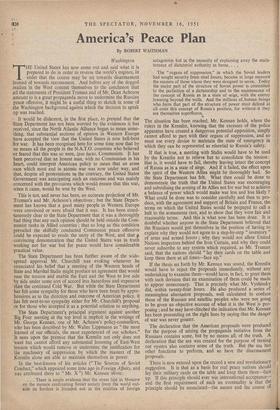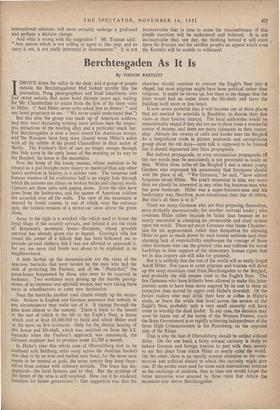America's Peace Plan
By ROBERT WAITHMAN
Washington THE United States has now come out and said what it is prepared to do in order to reverse the world's engines, in order that the course may be set towards disarmament instead of towards rearmament. And before any of the dogged ,realists in the West commit themselves to the conclusion that all the statements of President Truman and of Mr. Dean Acheson amount to is a great propaganda move to undermine the Russian peace offensive, it might be a useful thing to sketch in some of the Washington background against which the decision to speak up was reached.
It would be dishonest, in the first place, to pretend that the :State Department has not been worried by the evidences it has received, since the North Atlantic Alliance began to mean some- thing, that substantial sections of opinion in Western Europe have accepted the view that the United States is now hell-bent for war. It has been recognised here for some time now that by no means all the people in the N.A.T.O. countries who believed or feared that this was so were, ipso facto, Communists. It has been perceived that an honest man, with no Communism in his heart, could interpret American policy to mean that an arms .race which must end in atomic war was now under way, and that, despite all protestations to, the contrary, the United States Government was anticipating such an outcome and was mainly concerned with the provisions which would ensure that this war, when it came, would be won by the West.
This is not, and never has been, an accurate projection of Mr. Truman's and Mr. Acheson's objectives ; but the State Depart- ment has known that a good many people in Western Europe were convinced or were afraid that it was. It has been simul- taneously clear to the State Department that it was a thoroughly .bad thing that any such opinion s,hould be held outside the Com- munist ranks in Allied countries ; that so long as this condition prevailed the skilfully conducted Communist peace offensive could be expected to erode the unity of the West, and that # convincing demonstration that the United States was in truth working not for war but for peace would have considerable practical value.
The State Department has been further aware of the wide- spread approval Mr. Churchill was evoking whenever he enunciated his belief that a meeting of the Western heads of State and Marshal Stalin might produce an agreement that would ease the tension and enable the East and the West to live side by side under some sort of accord less hazardous and expensive than the continued Cold War. But while the State Department has felt some sympathy for those who have been beset by appre- hensions as to the direction and outcome of American policy, it has felt next-to-no sympathy either for Mr. Churchill's proposal or for those who accepted it as a potential solution to anything.
The State Department's, principal argument against another Big Four meeting at the top level is implicit in the writings of Mr. George Kennan, one of Mr. Acheson's policy-counsellors, who has been described by Mr. Walter Lippmann as "the most learned of our officials, the most experienced of our scholars." )1.t rests upon the premise that the Kremlin not only does not 'want but cannot afford any substantial lessening of East-West tension which would remove or undermine the justification for the machinery of suppression by which the masters of the Kremlin alone are able to maintain themselves in power.
In the best-known of his articles (" The Sources of Soviet Conduct," which appeared some time ago in Foreign Affairs, and was attributed there to "Mr. X ") Mr. Kennan wrote: . . . There is ample evidence that the stress laid in Moscow on the menace confronting Soviet society from the world out- side its borders is founded •not in the realities of foreign
antagonism but in the necessity of explaining away the main- tenance of dictatorial authority at home. . . .
The "organs of suppression," in which the Soviet leaders
had sought security from rival forces, became in large measure the masters of those whom they were designed to serve. Today the major part of the structure of Soviet power is committed to the perfection of a dictatorship and to the maintenance of the concept of Russia as in a state of seige, with the enemy lowering beyond the walls. And the millions of human beings who form that part of the structure of power must defend at all costs this concept of Russia's position, for without it they are themselves superftuous.
, The situation has been reached, Mr. Kennan holds, where the rulers in the Kremlin, knowing that the excesses of the police apparatus have created a dangerous potential opposition, simply cannot afford to part with their organs of suppression, and so must use every device to maintain the state of emergency in which they can be represented as e4sential to Russia's safety.
If that is true, a meeting with Stalin would have to be used by the Kremlin not to relieve but to consolidate the tension: that is, it would have to fail, thereby leaving intact the concept of Russia as in a state of siege. And if it failed, the effect upon the spirit of the Western Allies might be thoroughly bad. So the State Department has felt. What then could be done to demonstrate the truth that the United States was encouraging and subsidising the arming of its Allies not for war but to achieve a balance of power which would make war less and less likely ? What could be done was to consider carefully and then to pro- duce, with the agreement and support of Britain and France, the terms on which the United States would be prepared to call a halt to the armaments race, and to show that they were fair and reasonable terms. And this is what now has been done. It is doubtful whether anyone in the State Department believed that the Russians would put themselves in the position of having to explain why they would not agree to a step-by-step " inventory " of arms and armed forces ; why they would not allow United Nations inspectors behind the Iron Curtain, and why they could never subscribe to any system which required, as Mr. Truman said, that the nations should "lay their cards on the table and keep them there at all times—face up."
If the thesis set forth by Mr. Kennan was sound, the Kremlin would have to reject the proposals immediately, without any undertaking to examine them—would have, in fact, to greet them with such derision that an examination of them could be made to appear unnecessary. That is precisely what Mr. Vyshinsky did, within twenty-four hours. He also produced a series of meaningless alternative proposals, well calculated to confuse those of the Russian and satellite peoples who were not going to be given an objective account of what it is the West is pro- posing ; and he may have clinched the indication that Mr. Kerman has been proceeding on the right lines by saying that the danger of war was never greater.
The declaration that the American proposals were produced for the purpose of seizing the propaganda initiative from the Russians contains some, but by no means all, of the truth. A declaration that the sea was created for the purpose of turning out oysters also contains some of the truth. But the sea has other functions to perform, and so have the disarmament proposals.
There is now entered upon the record a new and revolutionary suggestion. It is that as a basis for real peace nations should lay their military cards on the table and keep them there—face up. If this principle should ever win international acceptance— and the first requirement of such an eventuality is that the principle should be enunciated—the nature and the course of international relations will most certainly undergo a profound and perhaps a decisive change.
And what is wrong with the suggestion ? Mr. Truman said: "Any nation which is not willing to agree to this step, and to carry it out, is not really interested in disarmament." It is not inconceivable that in time to come the reasonableness of this simple assertion will be understood and believed. It is not inconceivable that, one day, the thinking behind it will exert upon the Russian and the satellite peoples an appeal which even the Kremlin will be unable to withstand.















































































 Previous page
Previous page